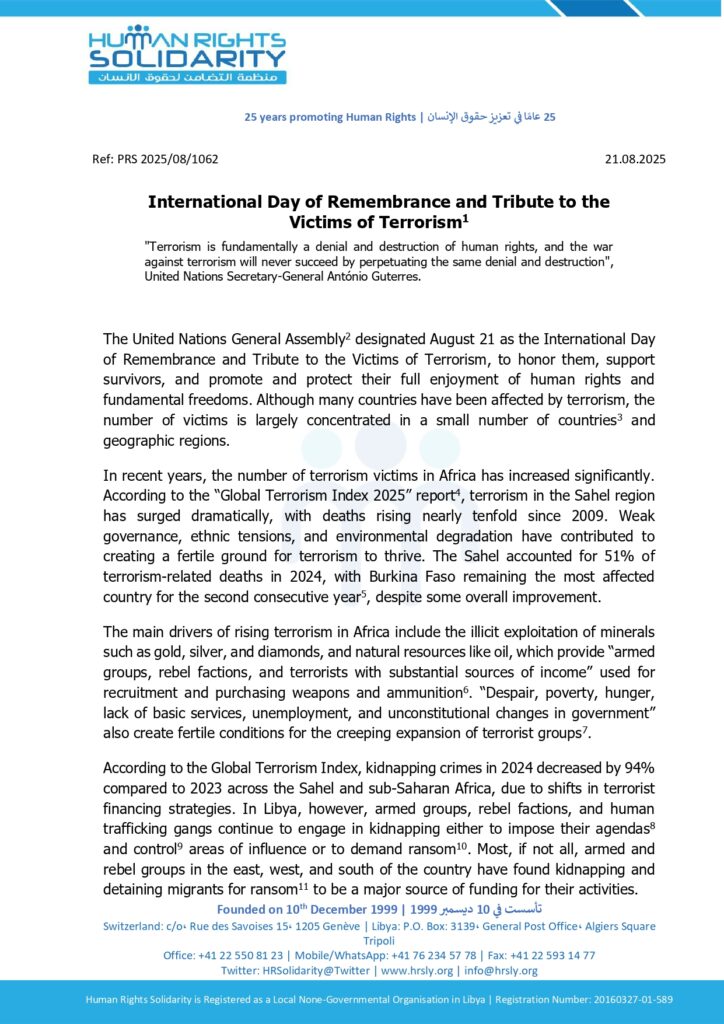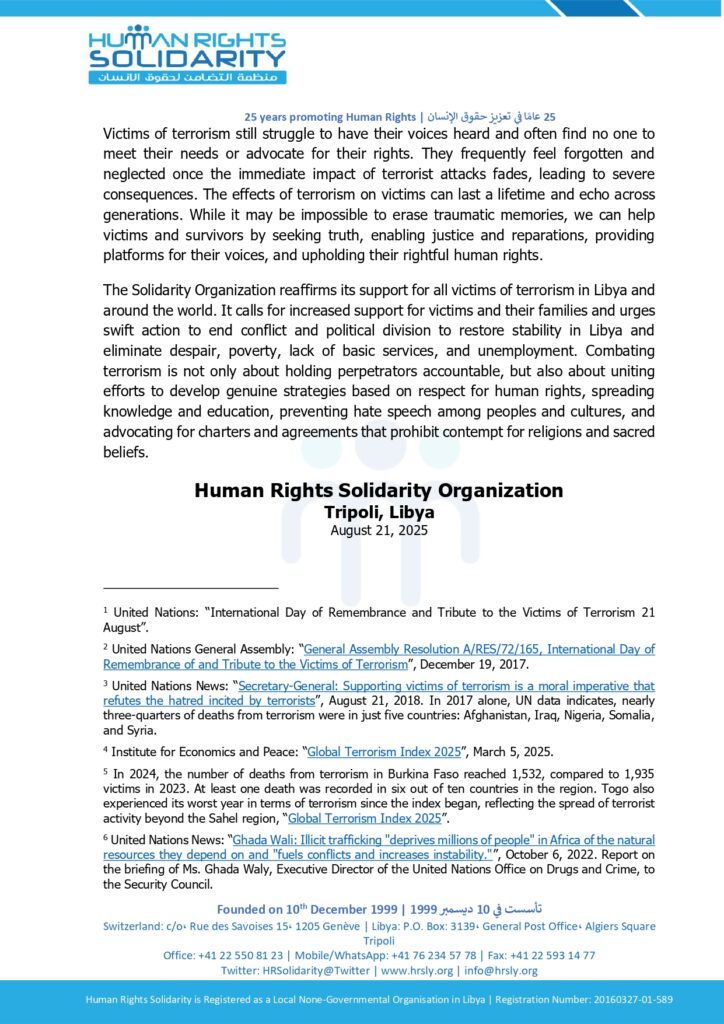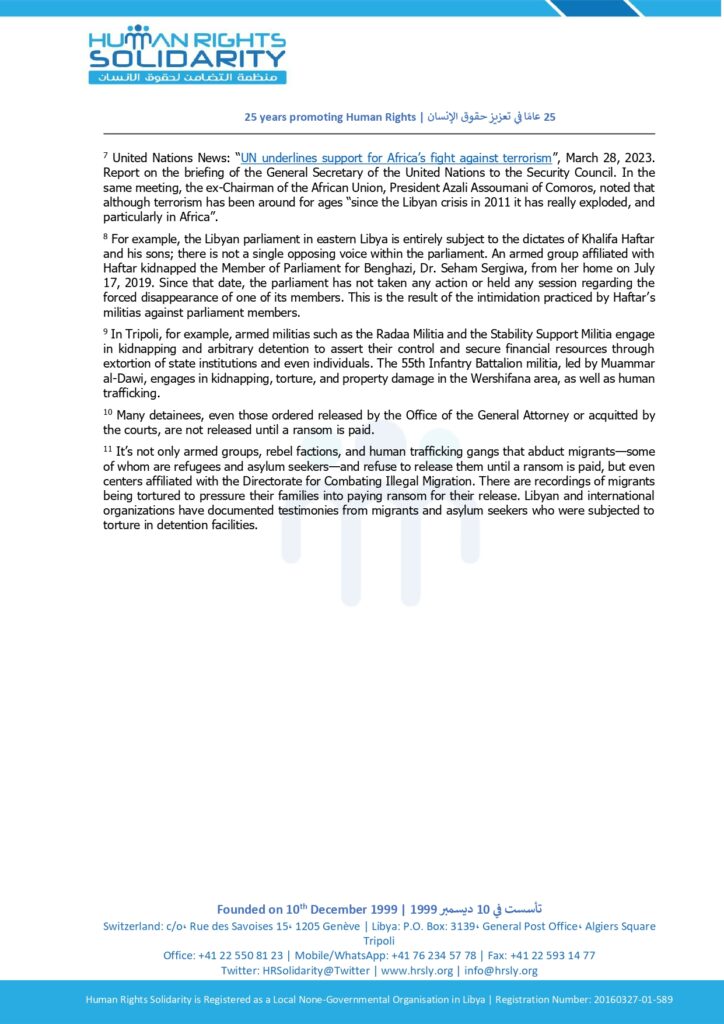International Day of Remembrance and Tribute to the Victims of Terrorism
| Ref: PRS 2025/08/1062 | 21.08.2025 |
International Day of Remembrance and Tribute to the Victims of Terrorism[1]
“Terrorism is fundamentally a denial and destruction of human rights, and the war against terrorism will never succeed by perpetuating the same denial and destruction”, United Nations Secretary-General António Guterres.
The United Nations General Assembly[2] designated August 21 as the International Day of Remembrance and Tribute to the Victims of Terrorism, to honor them, support survivors, and promote and protect their full enjoyment of human rights and fundamental freedoms. Although many countries have been affected by terrorism, the number of victims is largely concentrated in a small number of countries[3] and geographic regions.
In recent years, the number of terrorism victims in Africa has increased significantly. According to the “Global Terrorism Index 2025” report[4], terrorism in the Sahel region has surged dramatically, with deaths rising nearly tenfold since 2009. Weak governance, ethnic tensions, and environmental degradation have contributed to creating a fertile ground for terrorism to thrive. The Sahel accounted for 51% of terrorism-related deaths in 2024, with Burkina Faso remaining the most affected country for the second consecutive year[5], despite some overall improvement.
The main drivers of rising terrorism in Africa include the illicit exploitation of minerals such as gold, silver, and diamonds, and natural resources like oil, which provide “armed groups, rebel factions, and terrorists with substantial sources of income” used for recruitment and purchasing weapons and ammunition[6]. “Despair, poverty, hunger, lack of basic services, unemployment, and unconstitutional changes in government” also create fertile conditions for the creeping expansion of terrorist groups[7].
According to the Global Terrorism Index, kidnapping crimes in 2024 decreased by 94% compared to 2023 across the Sahel and sub-Saharan Africa, due to shifts in terrorist financing strategies. In Libya, however, armed groups, rebel factions, and human trafficking gangs continue to engage in kidnapping either to impose their agendas[8] and control[9] areas of influence or to demand ransom[10]. Most, if not all, armed and rebel groups in the east, west, and south of the country have found kidnapping and detaining migrants for ransom[11] to be a major source of funding for their activities.
Victims of terrorism still struggle to have their voices heard and often find no one to meet their needs or advocate for their rights. They frequently feel forgotten and neglected once the immediate impact of terrorist attacks fades, leading to severe consequences. The effects of terrorism on victims can last a lifetime and echo across generations. While it may be impossible to erase traumatic memories, we can help victims and survivors by seeking truth, enabling justice and reparations, providing platforms for their voices, and upholding their rightful human rights.
The Solidarity Organization reaffirms its support for all victims of terrorism in Libya and around the world. It calls for increased support for victims and their families and urges swift action to end conflict and political division to restore stability in Libya and eliminate despair, poverty, lack of basic services, and unemployment. Combating terrorism is not only about holding perpetrators accountable, but also about uniting efforts to develop genuine strategies based on respect for human rights, spreading knowledge and education, preventing hate speech among peoples and cultures, and advocating for charters and agreements that prohibit contempt for religions and sacred beliefs.
Human Rights Solidarity Organization
Tripoli, Libya
August 21, 2025
[1] United Nations: “International Day of Remembrance and Tribute to the Victims of Terrorism 21 August”.
[2] United Nations General Assembly: “General Assembly Resolution A/RES/72/165, International Day of Remembrance of and Tribute to the Victims of Terrorism”, December 19, 2017.
[3] United Nations News: “Secretary-General: Supporting victims of terrorism is a moral imperative that refutes the hatred incited by terrorists”, August 21, 2018. In 2017 alone, UN data indicates, nearly three-quarters of deaths from terrorism were in just five countries: Afghanistan, Iraq, Nigeria, Somalia, and Syria.
[4] Institute for Economics and Peace: “Global Terrorism Index 2025”, March 5, 2025.
[5] In 2024, the number of deaths from terrorism in Burkina Faso reached 1,532, compared to 1,935 victims in 2023. At least one death was recorded in six out of ten countries in the region. Togo also experienced its worst year in terms of terrorism since the index began, reflecting the spread of terrorist activity beyond the Sahel region, “Global Terrorism Index 2025”.
[6] United Nations News: “Ghada Wali: Illicit trafficking “deprives millions of people” in Africa of the natural resources they depend on and “fuels conflicts and increases instability.””, October 6, 2022. Report on the briefing of Ms. Ghada Waly, Executive Director of the United Nations Office on Drugs and Crime, to the Security Council.
[7] United Nations News: “UN underlines support for Africa’s fight against terrorism”, March 28, 2023. Report on the briefing of the General Secretary of the United Nations to the Security Council. In the same meeting, the ex-Chairman of the African Union, President Azali Assoumani of Comoros, noted that although terrorism has been around for ages “since the Libyan crisis in 2011 it has really exploded, and particularly in Africa”.
[8] For example, the Libyan parliament in eastern Libya is entirely subject to the dictates of Khalifa Haftar and his sons; there is not a single opposing voice within the parliament. An armed group affiliated with Haftar kidnapped the Member of Parliament for Benghazi, Dr. Seham Sergiwa, from her home on July 17, 2019. Since that date, the parliament has not taken any action or held any session regarding the forced disappearance of one of its members. This is the result of the intimidation practiced by Haftar’s militias against parliament members.
[9] In Tripoli, for example, armed militias such as the Radaa Militia and the Stability Support Militia engage in kidnapping and arbitrary detention to assert their control and secure financial resources through extortion of state institutions and even individuals. The 55th Infantry Battalion militia, led by Muammar al-Dawi, engages in kidnapping, torture, and property damage in the Wershifana area, as well as human trafficking.
[10] Many detainees, even those ordered released by the Office of the General Attorney or acquitted by the courts, are not released until a ransom is paid.
[11] It’s not only armed groups, rebel factions, and human trafficking gangs that abduct migrants—some of whom are refugees and asylum seekers—and refuse to release them until a ransom is paid, but even centers affiliated with the Directorate for Combating Illegal Migration. There are recordings of migrants being tortured to pressure their families into paying ransom for their release. Libyan and international organizations have documented testimonies from migrants and asylum seekers who were subjected to torture in detention facilities.




